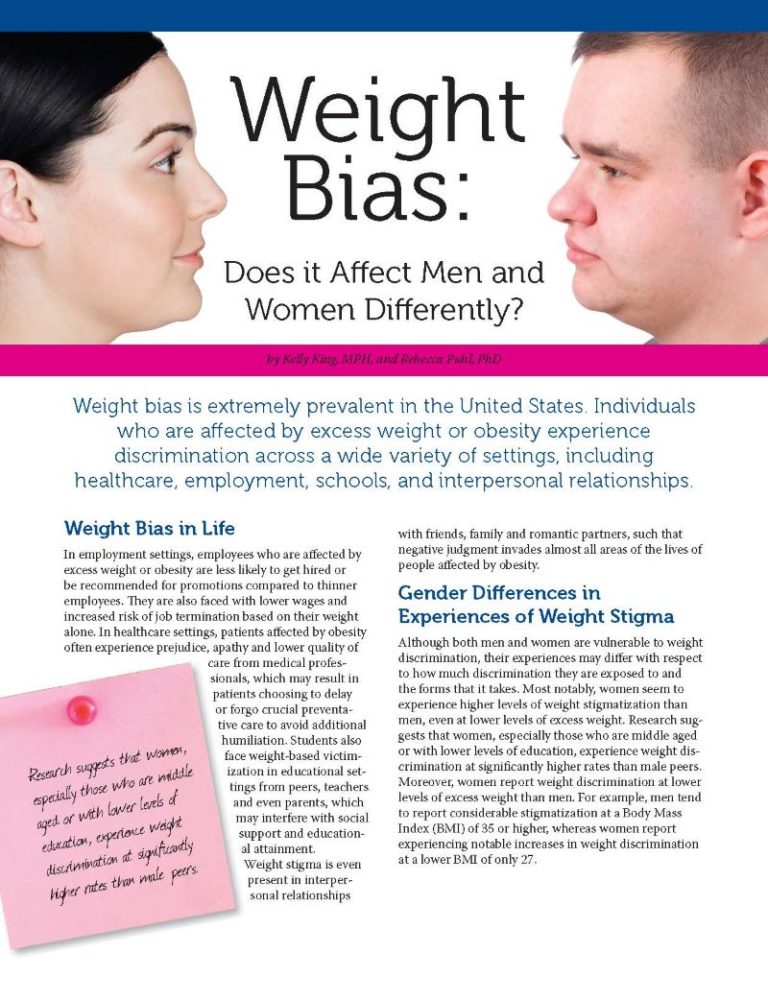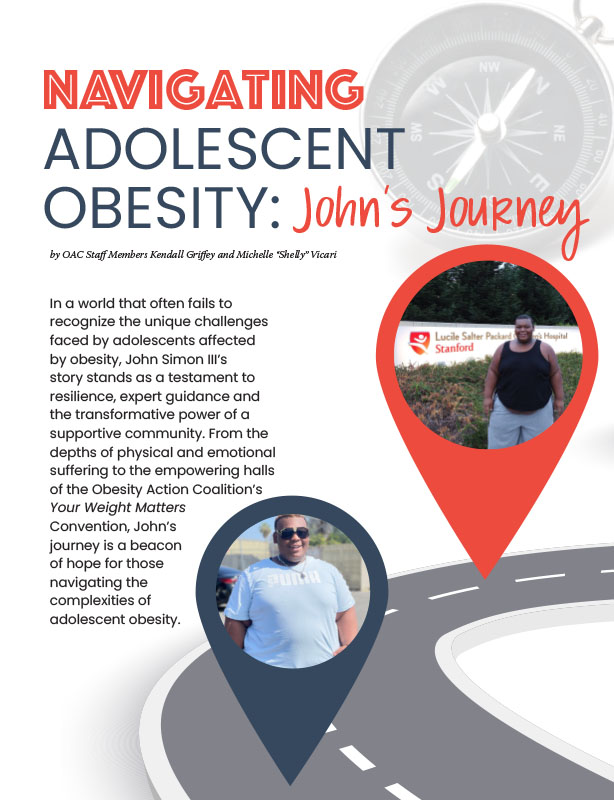Weight Bias: Does it Affect Men and Women Differently?


by Kelly King, MPH, and Rebecca Puhl, PhD
Spring 2013
Weight bias is extremely prevalent in the United States. Individuals who are affected by excess weight or obesity experience discrimination across a wide variety of settings, including healthcare, employment, schools, and interpersonal relationships.
Weight Bias in Life
In employment settings, employees who are affected by excess weight or obesity are less likely to get hired or be recommended for promotions compared to thinner employees. They are also faced with lower wages and increased risk of job termination based on their weight alone. In healthcare settings, patients affected by obesity often experience prejudice, apathy and lower quality of care from medical professionals, which may result in patients choosing to delay or forgo crucial preventative care to avoid additional humiliation. Students also face weight-based victimization in educational settings from peers, teachers and even parents, which may interfere with social support and educational attainment. Weight stigma is even present in interpersonal relationships with friends, family and romantic partners, such that negative judgment invades almost all areas of the lives of people affected by obesity.
Gender Differences in Experiences of Weight Stigma
Although both men and women are vulnerable to weight discrimination, their experiences may differ with respect to how much discrimination they are exposed to and the forms that it takes. Most notably, women seem to experience higher levels of weight stigmatization than men, even at lower levels of excess weight. Research suggests that women, especially those who are middle aged or with lower levels of education, experience weight discrimination at significantly higher rates than male peers. Moreover, women report weight discrimination at lower levels of excess weight than men. For example, men tend to report considerable stigmatization at a Body Mass Index (BMI) of 35 or higher, whereas women report experiencing notable increases in weight discrimination at a lower BMI of only 27.
North American ideals of physical attractiveness, which emphasize thinness as central to feminine beauty, may account for some of these differences. Women whose bodies deviate, even slightly, from physical beauty standards may be vulnerable to weight stigmatization. Given that thinness ideals have become deeply ingrained into our society and are heavily promoted by the mass media, diet industry and fashion industry, it’s not surprising to see widespread weight stigmatization toward women, even if they are not “obese.” For women, weight discrimination has been associated with poorer body image, low self-esteem, depression, anxiety, and a range of unhealthy eating behaviors, including binge eating.
Workplace
The workplace is a setting that is particularly wrought with weight discrimination, and also one where gender differences may emerge. Men and women who are affected by excess weight are both less likely to be hired and are evaluated more negatively than non-overweight individuals. Some studies suggest, however, that women are up to 16 times more likely to perceive weight discrimination in employment settings than men.
Female job applicants who are affected by excess weight are less likely than male applicants to be recommended for hiring. Gender differences have also been documented in obesity-related wage penalties, where women who are affected by obesity tend to earn salaries that are 6 percent lower than thinner women (for the same work performed), whereas men who are affected by obesity experience a smaller wage penalty: 3 percent less than thinner men. While there is certainly evidence of weight discrimination toward men in employment settings, it appears to be less severe and occurs at higher body weights compared to women.
Within the political arena, similar gender differences have been documented. Research examining political candidates has found that female candidates who are affected by excess weight receive lower ratings of reliability, dependability, honesty, ability to inspire, and ability to perform a strenuous job than non-overweight female candidates. This finding did not hold true for men. In fact, male political candidates who were affected by excess weight actually received more positive ratings than male candidates not affected by excess weight.
Ethnicity
Gender differences in weight discrimination may also vary by ethnicity. For example, some research has found that African American men experience lower levels of weight stigmatization from both other African American men and Caucasian men, compared to their Caucasian male counterparts. In addition to experiencing less stigma, African American men were also less likely themselves to stigmatize women affected by excess weight. Instead, they were more likely to endorse a wider range of larger body types as being physically attractive. In contrast, Caucasian men almost exclusively rated thin bodies as attractive bodies.
Among women, similar ethnic differences are apparent. African American women are less likely to stigmatize other women of color, or to be stigmatized by Caucasian men on the basis of their body size. These findings may reflect societal constructions of beauty in American culture that often emphasize not just a thin ideal, but a thin, Caucasian ideal. As such, cultural understandings of beauty, often propagated by the mainstream media, may translate into less pervasive stigmatization of individuals who are affected by excess weight in minority groups. Still, this area of research has not received enough attention, and more work is needed to better understand differences in weight discrimination among different ethnic and cultural groups.
Gender Differences in Children and Adolescents
Many youth are vulnerable to the negative social and emotional consequences of obesity. For children, experiencing weight stigmatization (often in the form of bullying and victimization) may hinder social relationships, interfere with academic development and even compromise physical health.
Mixed findings have emerged with respect to gender differences in weight stigmatization experienced by youth and adolescents. Some studies have found that girls experience more weight-based victimization, reporting higher levels of teasing and being assigned more negative characteristics as a result of their weight than boys. Other research, however, has failed to find sex differences in vulnerabilities. It may be that differences are more apparent in the types of stigmatization experienced by boys and girls, rather than the quantity or amount of these experiences.
For example, weight-based bullying may be more prevalent among boys who are affected by excess weight, whereas girls may experience more weight-based victimization in the form of social exclusion from their peers.
Boys and girls who experience weight-based victimization are at increased risk for negative social and educational outcomes, however, these risks seem to be even more pronounced for girls who are overweight, display lower academic self-esteem and are significantly more likely to be held back a grade than boys. Girls are also more likely to experience negative psychological outcomes, like depression in response to experiences of weight victimization, and may endure more pronounced difficulties in interpersonal relationships with peers and dating partners in adolescence.
Research shows that adolescent and young adult women who are affected by excess weight have lower potential for romantic relationships compared to their non-overweight peers. However, for young men, being affected by excess weight may not be detrimental to dating and forming romantic relationships. In fact, it may even be
associated with positive and desirable characteristics like strength and masculinity.
Conclusion
More research is needed to better understand the nature and extent of gender differences in experiences of weight stigmatization. However, it does appear that some differences may exist, particularly that girls and women may have heightened vulnerability in certain contexts compared to boys and men. These differences are important to be aware of, especially for employers in the workplace and educators in schools, who can intervene to help reduce weight stigmatization in these settings and be prepared to offer support to those facing stigmatization, with the knowledge that girls and boys, or women and men, may be impacted by weight stigmatization in different ways. For more information (including free resources, videos, handouts and articles) on weight bias and discrimination, please visit www.yaleruddcenter.org.
DID YOU KNOW?
Did you know the OAC has a weight bias initiative, Bias Busters, which aims to identify and eradicate weight bias? To learn more, visit www.obesityaction.org and click on the “Weight Bias” tab located at the top of the Web site.
About the Authors:
Rebecca M. Puhl, PhD, is a Senior Research Scientist and Director of Research at the Rudd Center for Food Policy & Obesity at Yale University. Dr. Puhl’s work examines the prevalence and origins of weight stigma, interventions to reduce weight bias, and the impact of weight stigma on emotional and physical health of children and adults affected by excess weight and obesity.
Kelly King, MPH, is a Research Associate at the Rudd Center for Food Policy & Obesity at Yale University. Kelly received her BA in Psychology from Amherst College and her Master of Public Health in Behavioral Science and Health Education from Emory University. Kelly is interested in how structural factors, like bias and stigma, impact individual and community level health.
by Nina Crowley, PhD, RD (with Inspiration from Shawn Cochran) Winter 2024 Dating, no matter your age,…
Read Articleby Leslie M. Golden, MD, MPH, ABOM Diplomate Winter 2024 The journey to overcoming obesity is a…
Read Articleby OAC Staff Members Kendall Griffey and Michelle “Shelly” Vicari Winter 2024 In a world that often…
Read Article








